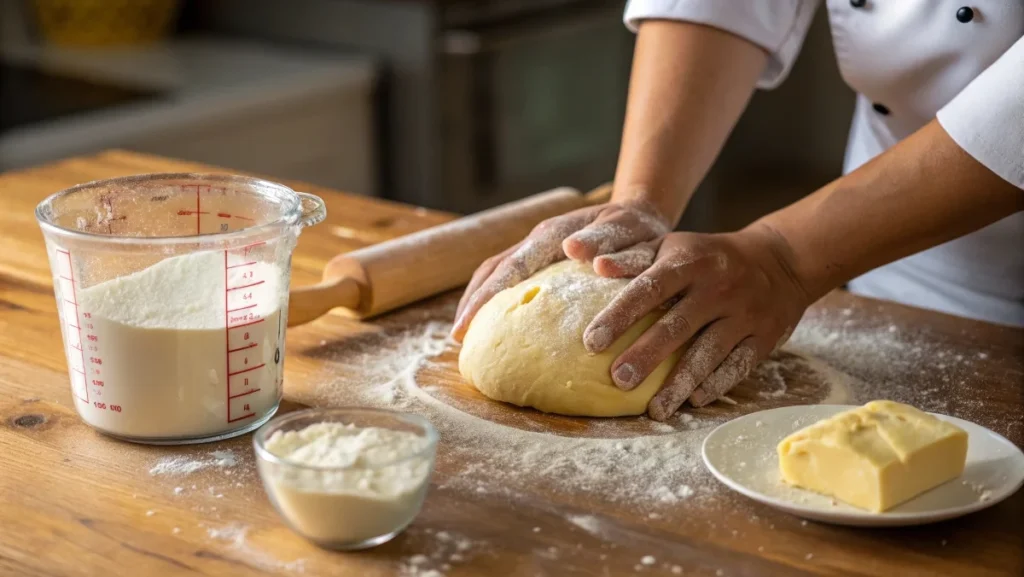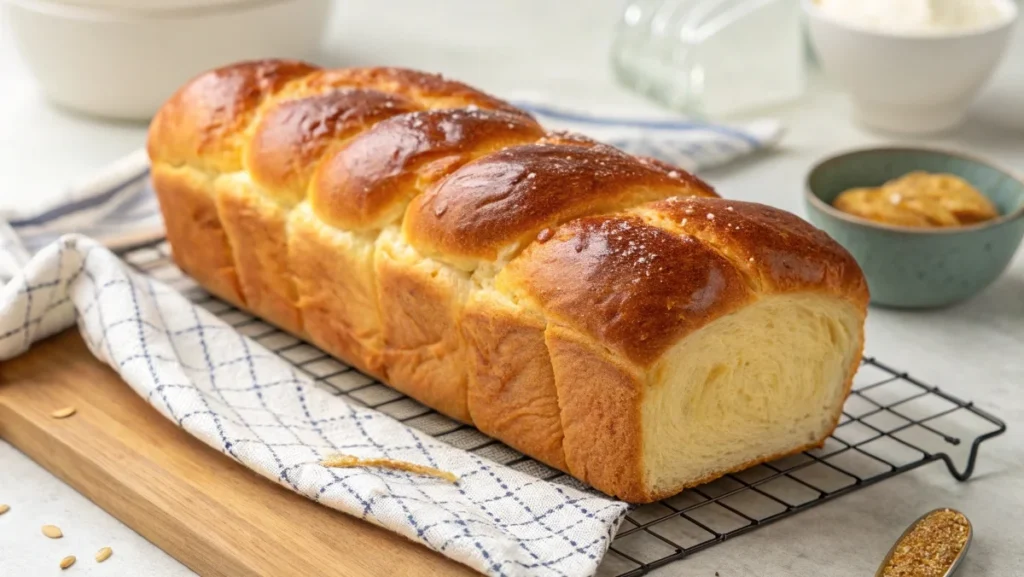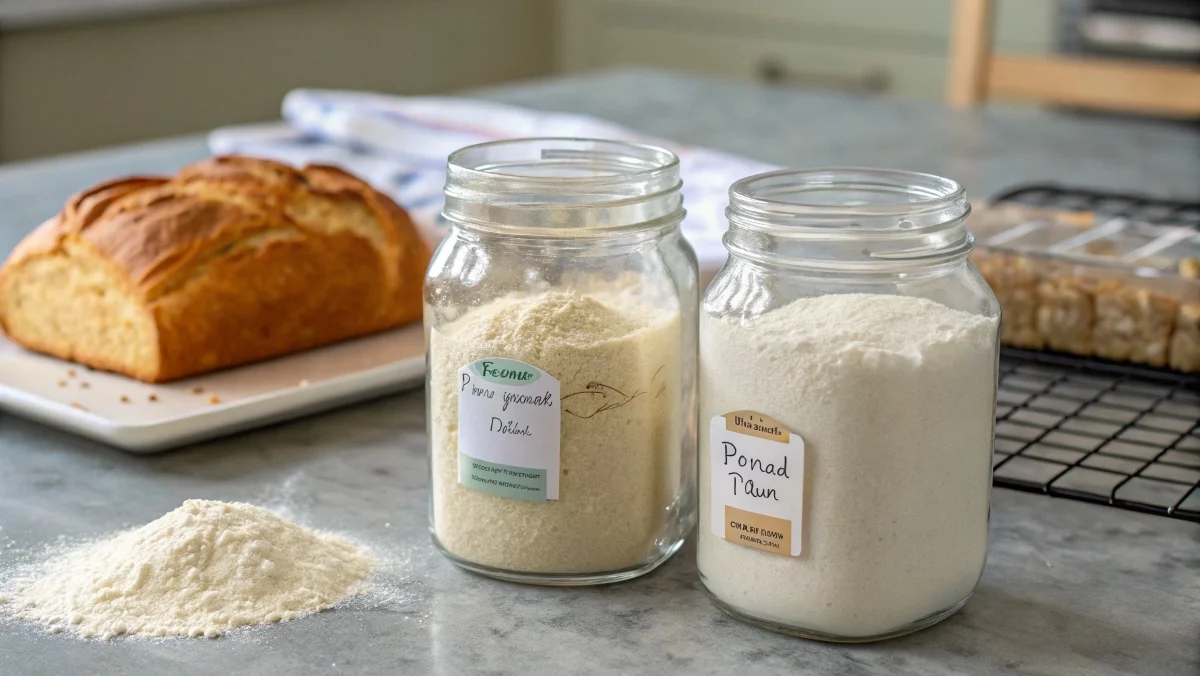Introduction
Have you ever wondered why some brioche loaves turn out delightfully soft and pillowy, while others feel dense and heavy? It all comes down to one crucial ingredient: flour. Whether you’re a seasoned baker or just starting your brioche journey, knowing what is the best flour for brioche can make all the difference. Imagine pulling a golden, buttery loaf from your oven, its aroma filling the kitchen, and knowing it’s the perfect balance of lightness and flavor. Sounds like magic, doesn’t it? Well, it starts with understanding the role of flour!
Brioche is one of those recipes that feels like a small triumph every time you make it. With its rich, tender crumb, it’s a treat that transforms simple mornings into something special. By the end of this article, you’ll know exactly which flour will help you achieve bakery-worthy brioche at home. So, let’s get started!
Table of Contents
Understanding the Role of Flour in Brioche Dough

How Flour Affects Brioche Texture and Flavor
Flour is the heart of brioche dough, determining whether your loaf is light and fluffy or dense and chewy. First, the type of flour you use directly impacts the texture. High-protein flours create stronger gluten structures, giving the dough elasticity. This helps brioche rise beautifully. Meanwhile, low-protein flours result in a softer, more cake-like texture. Next, the flavor of brioche also depends on the flour. Bread flour enhances the natural wheat taste, while all-purpose flour has a milder profile. Additionally, how you mix the flour with wet ingredients can change the texture and flavor. For example, kneading develops gluten and creates that signature fluffy crumb.
| Flour Type | Texture | Flavor |
|---|---|---|
| Bread Flour | Chewy, elastic | Rich, wheat flavor |
| All-Purpose Flour | Soft, tender | Mild, neutral |

The Importance of Protein Content in Flour
Protein content is a game-changer when it comes to brioche. High-protein flours, like bread flour, contain more gluten-forming proteins. This means they can trap more air, resulting in a taller rise and fluffier texture. On the other hand, low-protein flours, such as pastry flour, don’t develop as much gluten, making the dough softer but less structured. For brioche, a protein content of around 11-13% is ideal. First, it ensures your dough has enough strength to hold its shape. Then, it balances the softness you expect from brioche.
| Protein Content | Resulting Texture | Best Uses |
|---|---|---|
| High (12-14%) | Structured, airy | Brioche, bread |
| Moderate (10-12%) | Soft, tender | General baking, cakes |
| Low (8-10%) | Delicate, crumbly | Pastry, cookies |
Comparing Common Flour Types for Brioche
All-Purpose Flour vs. Bread Flour for Brioche
Choosing between all-purpose and bread flour can feel tricky. All-purpose flour is versatile and widely available, making it a popular choice for brioche. Its moderate protein content creates a softer crumb, which some prefer. Bread flour, however, has a higher protein content. This gives brioche more structure and helps it rise higher. It’s perfect if you love a tall, bakery-style loaf. In addition, bread flour often results in a chewier texture, while all-purpose flour keeps things light. If you can’t decide, try mixing the two flours to get the best of both worlds.
| Feature | All-Purpose Flour | Bread Flour |
|---|---|---|
| Protein Content | Moderate (10-12%) | High (12-14%) |
| Texture | Soft, tender | Chewy, structured |
| Best For | Softer brioche | Tall, bakery-style loaf |
Specialty Flours and Their Unique Benefits
Sometimes, stepping outside the basics can take your brioche to the next level. Specialty flours, like spelt or whole wheat, add depth of flavor. First, spelt flour introduces a nutty taste and extra nutrients. Then, whole wheat flour offers a hearty texture and fiber boost. Another option is gluten-free flour blends, ideal for those with dietary needs. However, they may require additional binders, like xanthan gum, for structure.
- Spelt Flour: Adds nutty flavor and mild sweetness.
- Whole Wheat Flour: Rich flavor with added fiber.
- Gluten-Free Blends: Great for special diets but may need tweaking.
| Specialty Flour | Flavor | Key Benefit |
|---|---|---|
| Spelt | Nutty, sweet | Extra nutrients |
| Whole Wheat | Rich, hearty | Fiber boost |
| Gluten-Free Blend | Neutral | Suitable for all diets |
Choosing the Right Flour for Brioche Baking at Home
Factors to Consider When Selecting Flour
When picking flour for brioche, think about protein content, availability, and your personal preferences. First, check the protein percentage. Bread flour, with its high protein, creates a structured dough that rises well. All-purpose flour is easier to find and produces a softer texture. Next, consider the flavor. Specialty flours like spelt or whole wheat can add a unique twist to classic brioche. Then, availability matters. Choose a flour that’s easy to find locally or online to simplify your baking.
| Factor | What to Look For |
|---|---|
| Protein Content | 11-13% for a good balance of softness and structure |
| Flavor Profile | Mild (all-purpose) or rich (bread or specialty flours) |
| Availability | Easy-to-find options work best for consistent results |
The Best Flour Brands for Consistent Results
For brioche that impresses every time, picking a reliable brand matters. First, King Arthur Bread Flour is a top choice for its consistent protein content. It’s perfect for tall, fluffy loaves. Then, Bob’s Red Mill offers both bread and all-purpose flours that are great for versatile baking. Another excellent option is Gold Medal All-Purpose Flour, which delivers a tender, soft crumb.
- King Arthur Bread Flour: Ideal for professional-level results.
- Bob’s Red Mill All-Purpose Flour: Reliable for various baking needs.
- Gold Medal All-Purpose Flour: Affordable and easy to find.
| Brand | Key Features |
|---|---|
| King Arthur | High protein, consistent quality |
| Bob’s Red Mill | Versatile and widely available |
| Gold Medal | Soft texture, budget-friendly |
Storing and Handling Flour for Optimal Brioche Results
Proper storage and handling of flour are essential to achieving the perfect brioche. By storing your flour correctly, you’ll maintain its quality and ensure the ideal texture for your dough. Let’s explore the best techniques for keeping flour fresh and ready for your next baking project.
Proper Storage Techniques to Preserve Flour Quality
To maintain flour’s freshness, store it in an airtight container in a cool, dry place. Avoid areas with moisture or direct sunlight, which can cause clumping and spoilage. For longer storage, refrigerate or freeze your flour to retain its quality and prevent pests. Don’t forget to check the expiration date to guarantee you’re using fresh flour in your brioche!
Tips for Measuring Flour Accurately
Accurate flour measurement is crucial for achieving perfect brioche. Use the spoon-and-level method to measure flour: first, spoon the flour into your measuring cup, then level it off with a flat edge. This ensures you don’t end up with too much flour, which could lead to a dense loaf. Avoid packing flour into the cup, as it can affect your dough’s texture.
With the perfect flour chosen, let’s bake the Golden Braided Brioche Loaf

Golden Braided Brioche Loaf
Ingredients
Great brioche starts with the right ingredients. Each one plays a key role in making this loaf irresistible:
- ¼ Cup Warm Water (110-120°F) – Warm water wakes up the yeast and gets it bubbling with energy. Think of it as the starter for your fluffy masterpiece.
- 1 tsp Dried Yeast (½ pkt) – This little powerhouse works magic, making your dough rise into pillowy perfection.
- 2 Tablespoons Sugar – Sweetness isn’t just for flavor; sugar feeds the yeast, ensuring a perfect rise.
- 3 Large Organic Eggs (Room Temperature) – Eggs add richness and help create the soft, tender crumb brioche is famous for.
- 2 – 2 ¼ Cups Unbleached Flour – Bob’s Red Mill is a great choice. This flour strikes the right balance between strength and softness.
- 1 tsp Sea Salt – Salt enhances flavor and controls yeast activity, keeping your dough balanced.
- 1 Stick Organic Butter (Room Temperature) – Butter makes your brioche rich, moist, and utterly decadent.
- 1 Egg Mixed with 1 Tablespoon Water – This egg wash gives your loaf its golden, shiny crust.
- Sesame Seeds (Optional) – For a nutty crunch, sprinkle these seeds on top before baking.
Step-by-Step Instructions
Follow these steps, and you’ll have a golden braided brioche ready to impress:
- Activate the Yeast – Combine warm water, yeast, and sugar in a small bowl. Stir gently and let it sit for 5 minutes. This step ensures your yeast is alive and ready.
- Mix the Dough – In a large bowl, beat the eggs and salt together. Add the yeast mixture and half the flour, stirring until smooth.
- Incorporate Butter – Gradually add butter, a tablespoon at a time, mixing well after each addition. The dough will become rich and glossy.
- Knead and Rise – Add the remaining flour and knead until smooth. Cover the bowl with a towel and let it rise in a warm spot for an hour.
- Shape and Braid – Divide the dough into three equal parts. Roll each into a long rope and braid them together. Place the braid on a baking sheet lined with parchment paper.
- Final Proofing – Cover and let the dough rise again for 30-40 minutes. It should double in size.
- Bake – Brush the loaf with egg wash and sprinkle sesame seeds if desired. Bake at 350°F for 20-25 minutes until golden.
Serving
This recipe makes a medium-sized loaf, perfect for sharing.
- How to Serve – Enjoy warm slices on their own, or slathered with butter or jam. It’s great for breakfast or an afternoon treat.
- Optional Pairings – Pair with a cup of tea, fresh fruit, or a bowl of hearty soup.
- For a Fun Twist – Use slices for decadent French toast or as a base for a savory sandwich.
Tips and Hacks
Here are some helpful tips to make your brioche unforgettable:
- Kneading Made Easy – If you have a stand mixer, let it do the work with the dough hook.
- Boost Flavor – Add a splash of vanilla extract or a pinch of nutmeg for extra depth.
- Make It Ahead – Refrigerate the dough after the first rise and bake the next day for fresh results.
- Storage – Store in an airtight container for up to 3 days or freeze for longer freshness.
Nutrition Facts
Serving size: 1 slice (based on 12 slices)
- Calories: 190
- Fat: 9g
- Carbs: 21g
- Protein: 4g
- Sodium: 180mg
- Fiber: 1g
Please note: These values may vary depending on brands and portion sizes.
Prep Time
- Prep time: 20 minutes
- Cook time: 25 minutes
- Total time: 45 minutes
Please note: Rising times are not included and may vary based on your kitchen’s temperature.
Here are some delightful pairings to complement your Golden Braided Brioche Loaf:
- Why Does Brioche Need to Sit Overnight?: Learn about the importance of letting brioche dough rest for optimal flavor and texture.
- What is the Difference Between Chocolate Babka and Brioche?: Discover how these two rich, sweet breads compare.
Frequently Asked Questions (FAQs)
What type of flour should I use for brioche?
When making brioche, opt for high-protein flours like bread flour. It gives the dough structure and supports that fluffy, tender texture. All-purpose flour works too, but bread flour brings out the best in brioche. It also helps achieve that golden, airy crumb you’re craving. So, next time you bake, go for bread flour, and you’ll see the magic happen!
Why is my brioche not fluffy?
If your brioche isn’t fluffy, it could be due to under-proofing or not enough yeast. Make sure your yeast is fresh, and give the dough plenty of time to rise. Also, check your flour choice—bread flour is best for light, airy brioche. Lastly, ensure you’re not overworking the dough, as that can make it dense. With a bit more patience, you’ll get that perfect fluffy texture!
What is the best flour for fluffy bread?
For fluffy bread, bread flour is your best bet. It has higher protein content, which helps develop gluten and gives bread its light, airy texture. Brioche especially benefits from bread flour because it makes the dough rise beautifully and creates a soft, tender crumb. You could also use a strong all-purpose flour if you prefer something milder. Either way, fluffy bread is totally achievable with the right flour!
What is the best flour for brioche reddit?
On Reddit, bread flour is often recommended as the best flour for brioche. It has higher protein content than all-purpose flour, helping the dough rise and develop that signature texture. Many bakers on Reddit swear by it, especially when making rich, buttery brioche. If you want the perfect fluffy loaf, bread flour is your go-to choice. You’ll get a golden, soft brioche that’s sure to impress!
Crafting the Perfect Brioche Starts with the Right Flour
Choosing the best flour for brioche is key to that light, fluffy texture. Opt for bread flour for its higher protein content, which creates a strong dough. This gives your brioche structure, while keeping it soft and tender. Don’t forget to let the dough rise fully for a beautiful, airy crumb. Bread flour truly shines in creating that golden, buttery loaf. With a little patience, the right flour makes all the difference. Happy baking!

